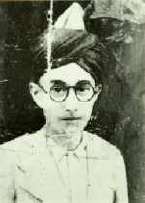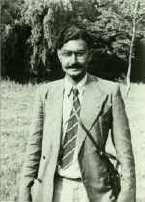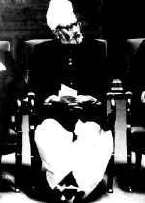Today marks Dr. Abdus Salam’s death anniversary. (See new biography of Dr. Salam here).
It should be a moment of deep reflection for all of us. He would have been as great a man as he was even if he did not won the Nobel Award in physics. But we would have conveniently forgotten him. That he did win the Nobel Award is a source of cosmetic and hollow pride for many Pakistanis. Cosmetic and hollow because it is also a source of visible unease. Even when we acknowledge that he was a great scientist (after all, the Nobel Committee thought so), we are uncomfortable acknowledging that he was a great man whose significance goes beyond his science.
As a brutally honest editorial in today’s Daily Times points out, “we are scared of honoring Dr. Salam.” We must not be.
The Daily Times editorial says all that needs to be said; it is worth reading, worth thinking about, and worth quoting in full:
The tragedy of our treatment of Dr Abdus Salam
Dr Abdus Salam (1926-1996) died ten years ago. He was the first Pakistani to get a Nobel Prize in 1979. But he might be the last if we continue to allow our state to evolve in a way that frightens the rest of the world. Our collective psyche runs more to accepted ‘wisdom’ than to scientific inquiry; and even if we were to display an uncharacteristic outcropping of individual genius the world may be so frightened of it that it might not give us our deserts.
We are scared of honouring Dr Salam because of our constitution which we have amended to declare his community as ‘non-Muslim’. When Dr Salam died in 1996 he had to be buried in Pakistan because he refused to give up his Pakistani nationality and acquire another that respected him more. But the Pakistani state was afraid of touching his dead body. He was therefore buried in Rabwa, the home town of his Ahmedi community whose name is also unacceptable to us and has been changed to Chenab Nagar by a state proclamation. But that was not the end of the story. After he was buried, the pious, law-abiding and constitution-loving people of Jhang, which is nearby, went over to Chenab Nagar to see if all had been done according to the constitutional provisions regarding the Ahmedi community to which he belonged.
And what did the constitution say? It said that the Ahmedis are not Muslims, that they may not call themselves Muslims, nor say the kalima or use any of the symbols of Islam. The original amendments to the constitution were passed by Z A Bhutto, a ‘liberal socialist-democrat’, and subsequent tightening of the law was done by the great patriot General Zia-ul Haq. Thus both the civilians and the khakis had connived in the great betrayal of Dr Salam.
After the great scientist was buried in Chenab Nagar, his tombstone said “Abdus Salam the First Muslim Nobel Laureate”. Needless to say, the police arrived with a magistrate and rubbed off the ‘Muslim’ part of the katba. Now the tombstone says: Abdus Salam the First Nobel Laureate. The magistrate remained unfazed by what he had done but Dr Salam’s grave is actually the tombstone of a Muslim culture that Pakistan had inherited from the founder of the nation, Quaid-e-Azam Muhammad Ali Jinnah. But ironies fly thick in Pakistan. In Jhang, for example, where Dr Salam grew up as a precocious child, the schools that he endowed with scholarships and grants now teach communal hatred rather than the love that he had in mind when he gave them his money.
Meanwhile, the Ahmedi community is under daily pressure and anyone with a twisted mind is free to persecute them.
Abdus Salam was born in Jhang in 1926. At the age of 14, he got the highest marks ever recorded for the Matriculation Examination in Punjab. The whole town turned out to welcome him. He won a scholarship to Government College, Lahore, and took his MA in 1946. In the same year he was awarded a scholarship to St. John’s College, Cambridge, where he took a BA (honours) with a double First in mathematics and physics in 1949. In 1950 he received the Smith’s Prize from Cambridge University for the most outstanding pre-doctoral contribution to physics. He also obtained a PhD in theoretical physics at Cambridge; his thesis, published in 1951, contained fundamental work in quantum electrodynamics which had already gained him an international reputation.
In 1954 Dr Salam left his native country for a lectureship at Cambridge University. Before the Pakistani politicians apostatised him, he was a member of the Pakistan Atomic Energy Commission, a member of the Scientific Commission of Pakistan and Chief Scientific Adviser to the President from 1961 to 1974. Pakistan’s space research agency Suparco was created by him and it is only symbolic that a group of Shia workers of Suparco were put to death in Karachi in 2004 by sectarian terrorists. Like Dr Salam, a lot of gifted Shia doctors have had to leave Pakistan because of the state’s twisted policies.
Dr Abdus Salam got his Nobel Prize for Physics in 1979. It was a most embarrassing moment for General Zia who had “supplemented” the Second Amendment to the constitution with further comic disabilities against the Ahmedis. He had to welcome the great scientist and had to be seen with him on TV. Since the clerical part of his government was already bristling, he took care to clip those sections of Dr Salam’s speech where he had said the kalima or otherwise used an Islamic expression. It was Dr Salam’s good luck that one of the believers did not go to court under Zia’s own laws to get the country’s only Nobel laureate sent to prison for six months of rigorous imprisonment. Dr Salam then went to India where he was received with great fanfare. He had gone there to simply meet his primary school mathematics teacher who was still alive. When the two met, Dr Salam took off his Nobel medal and put it around the neck of his teacher.
Let us admit in a whisper that Pakistan did issue a stamp commemorating Dr Salam years ago lest the government come under pressure to remove it from circulation. It is also true that his alma mater, Government College Lahore, now a university, has named certain ancillary departments and academic sessions after him following a long period of obscurantist domination. But Pakistan needs to feel guilty about what it has done to the greatest scientist it ever produced in comparison to the lionisation of Dr AQ Khan who has brought ignominy and the label of “rogue state” to Pakistan by selling the country’s nuclear technology for personal gain. Can we redeem ourselves by doing something in Dr Salam’s memory on this 10th anniversary of his passing that would please his soul and cleanse ours?
Repost: This post was originally published at ATP on November 22, 2006, on Dr. Salam’s 10th death anniversary.
























































I think it was at the time of Tughlaq that mullahs came to the court and advise the wise kind that as the daawat of Islam has been propagated fully so no all those who have not accepted it should be killed. The king looked at them, laughed and replied. Where would I get so much swords. There always have been two groups of clergy. One who spread the word of god thru love i:e Chistia etc and the other who in order to hide their ignorance want to just kill the non believers like our mullahs, spanish inquisition etc. just think of one fact. The muslims living in West are Ahmedis in their eyes as they are preaching a faith which does not believe that their faith is the final one. What if they start following the principles bestowed upon us by the constitution of the Islamic Republic of Pakistan. Jesus said the sinless will throw the first stone and it turned out that it was a mob of whores. Ain’t we the same
Unaiza Fatima,
Nobody can grantee 100% evenhandedness in any award that is granted by us, the human beings. With all fairness, Noble prize is the most prestigious award in specific fields. Unfortunately, most of so called
While I agree with this article’s viewpoint on Dr Salam, I feel one point needs clarification (if it has not been clarified already). The article states:
“Dr Abdus Salam got his Nobel Prize for Physics in 1979. It was a most embarrassing moment for General Zia who had
Unaiza.
Healthy nations are ashamed of their evil acts. Germans are not proud of Hitler anymore. Americans hang their heads in shame still on the segregation laws. Good nations change from within. And it is people like Adil Najam who keep poking our national concience until we realize our mistakes. Pakistani constitution is as much a source of pride for our countrymen as the fact that we are an agriculture based economy. Both haven’t worked.
In civilized society, minorities demand to be declared minorities to safeguard their rights. In Pakistan, a sect was declared a minority against their will. Such unprecedented acts of prejudice on a national scale are bound to damage the moral values of the citizens. Look at Pakistan now, no one is muslim anymore. Our Taliban neighbours have declared us all legitimate targets.
Sorry, Noble Prize does not impress a person like me who would question the fairness if this prize. For example, Thomas Edison’s contributions for science and humanity are far more than that of Mr. Salam’s. Yet Edison stands nowhere in the row of Noble Laureates.
Secondly, what is the writer crying at? Change the law and constitution just because someone won a prize abroad? Which country has ever changed its laws and constitution under such circumstances?We are proud of our country and constitution. Regarding ‘unfair’ treatment, many who have even bigger contributions for this country didn’t receive the deserved respect. They should be cried for first.